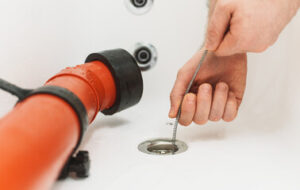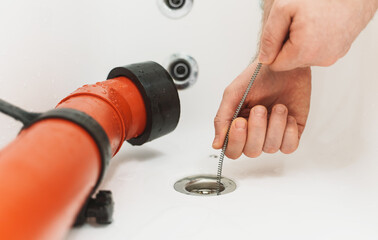Drain Cleaning Delaware County is a service that keeps your plumbing running at its best. Many homeowners tackle clogged drains with DIY methods like using a plunger or running their kitchen sink’s garbage disposal.
Many of these techniques use harsh chemicals that can damage your pipes. Most reputable plumbers recommend using more natural approaches to keep your drains clear and free-flowing.
Clogged drains are not only unpleasant, but they can lead to a host of other problems. From reduced water pressure to flooding and sewage backups, these blockages can cause major headaches. They can also result in long-term damage to pipes due to the accumulation of residue and waste. Fortunately, most drain clogs are preventable with some knowledge and elbow grease.
First, check to see what’s causing the clog: a kitchen sink clog often occurs from cooking oil and food scraps; bathroom tubs and showers become clogged with soap scum and hair; toilets can collect paper products or other obstructions. Identifying the type of clog can help you decide on a solution.
For simple kitchen and bathroom clogs, try a combination of baking soda and hot water. This is a cheap and easy-to-use DIY solution that works for most people. Baking soda is a base that reacts with an acid (vinegar) to break up clogs, and the hot water helps wash away the resulting mixture. If this doesn’t work, try pouring in half a cup of salt into the drain followed by boiling hot water.
If the clog persists, use a wire snake. These are available at most hardware stores and come in a variety of lengths and designs. If you want a less hands-on approach, try a wire hanger: unwrap it and feed the bent end down the drain; hook it onto whatever is blocking the line, then twist and pull to remove the clog.
Lastly, Calabrese recommends using Bio-Clean to clear stubborn clogs without damaging your pipes or killing the good bacteria in your home’s plumbing system. He describes it as a “non-toxic, non-caustic liquid that introduces friendly, good bacteria to your drain system while removing the gunky build-up” and says it’s great for routine maintenance.
Keeping drains clean is important to reduce unpleasant smells and prevent pest infestations. Clogged drains and pipes can produce stagnant water that attracts insects, such as cockroaches and fruit flies. They can also breed sewage flies and moth flies. Unclogging and thoroughly cleaning a drain can eliminate these pests and keep your home smelling fresh and clean.
Clogged Sewers
Clogged sewer lines can be a very serious problem that requires professional help to fix. Fortunately, there are also a few things you can do at home to prevent or clear up a main line clog before it gets too bad.
Grease is one of the most common causes of a main sewer line clog. If you pour grease down your drains, it will eventually cool and harden, which can stick to the sides of your pipes and prevent waste from flowing freely. Similarly, a build-up of soap scum can cause a blockage. To avoid this, pour hot water down your drains regularly to wash away build-up.
If you suspect a clog, put on gloves and clear out the area around the drain before using any tools. A manual drain snake is a popular choice, as it can dislodge large items that may be blocking your pipes. To use a snake, insert the end of the tool with a hook into the drain cover and begin shoving it in. Push gently at first, then gradually increase pressure. Turn the handle to navigate pipe curves and reach your clog. When you reach the clog, pull up on the snake and dispose of any debris.
For more serious clogs, consider hiring a professional to break up and remove the clog with an auger or wet/dry vacuum. This process may involve video inspections to locate the clog and tree roots, removing large items, and hydro jetting the pipes to clean them thoroughly.
You can minimize the risk of clogged sewers by installing screens and drain covers to keep hair and food scraps out of your pipes, and by using non-chemical drain cleaner. If you do need to use chemical cleaners, follow the product instructions carefully and always wear protective eyewear and gloves. Avoid mixing different cleaners, as this can create dangerous chemical reactions. If you’ve exhausted all other options, call a plumber for more extensive sewer cleaning. Be sure to take steps to prevent future clogs, such as by installing one-way valves on your sewer line.
Clogged Toilets
Clogged toilets are among the most unpleasant household situations, and learning how to clean a clogged toilet properly requires both skill and finesse. Fortunately, there are several home solutions that can help, and some can save you the need to call for professional drain cleaning services.
In many cases, a toilet that keeps clogging is simply the result of improper waste disposal. Non-flushable items like Q-tips, cotton balls, feminine products and more can collect in the pipes, collecting fluids to form a solid clog. If this is the case in your household, a flanged plunger can often dislodge these items and get your toilet back up and running.
However, if you’ve used a plunger and the problem persists, there is likely something further down the line, perhaps a break in the sewer line that allows foreign objects to enter and clog the toilet. This issue can also occur when you flush a toy down the toilet or a sanitary product that didn’t dissolve properly.
To check for this, you can try a snake or a toilet auger to break up and pull out the clog. If you don’t have either of these tools at home, you can use a wire hanger to do the job. To do this, unravel the end of the wire and place it down the drain, then prod it around until you break up the clog.
If you haven’t had luck with these methods, you can try a homemade drain cleaner combination of vinegar and baking soda. This can loosen a stubborn clog and make it easier to remove with a toilet auger or snake later on.
To create this natural clog buster, start by adding one cup of baking soda and two cups of vinegar to your toilet. The resulting chemical reaction should create enough fizz to break up and dislodge whatever is blocking the pipe. Follow this up with a bucket of hot water (not boiling, as this could crack your porcelain) poured into the toilet from waist level to help create pressure and further dislodge the clog.
Clogged Showers
There’s nothing more frustrating than showering after a long day only to find the drain smells and the water isn’t flowing down. If you suspect a clog, there are many things you can try before calling a plumber.
First, it’s a good idea to try to remove the clog with your hands before resorting to a chemical cleaner. You can do this by removing the drain cover, if possible, and using your hands to try to reach the blockage and pull it out. This method is usually successful with hair buildup, but if mineral buildup is the problem you may need a different solution.
Another simple way to try to clear a clog is by pouring boiling water down the drain. This can help break up soap scum and grease buildup, as well as dislodge any hair that might be in the drain. This is a great alternative to chemical cleaners, and it’s also safe for your pipes.
If these methods don’t work, you can always use a plunger to try to dislodge the clog. However, this method should only be used if you haven’t put any chemicals down your drain in the past day or two. Otherwise, you could cause more harm than good by forcing harsh chemicals into the pipe.
When all else fails, you can try a plumbing snake. This tool is available at most hardware stores and can be quite effective at clearing a clog. Just remember to be careful when using one, and always follow the manufacturer’s instructions.


